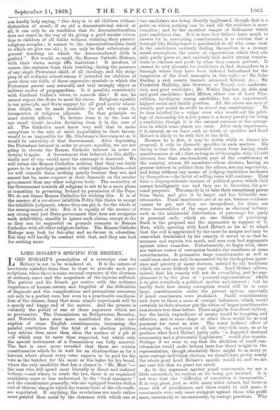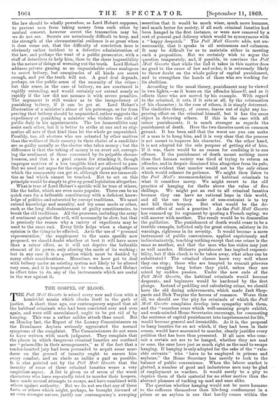LORD HOBART'S SPECIFIC FOR BRIBERY.
LORD HOBART'S prescription of a sovereign cure for Bribery is not to be wondered at. It is the nature of inveterate maladies from time to time to provoke such pre- scriptions, when there is some unusual exposure of the slowness of ordinary cures and the magnitude of the injuries suffered. The patient and his friends get restive with the ordinary impatience of human nature, and, forgetful of the difficulties of diagnosis and the complications and precautions necessary not only to a perfect cure, but even to a practicable ameliora- tion of the disease, fancy that some simple experiment will be a speedy and happy end of the matter. And the present is certainly the period of one of those exposures which are so provocative. The Commissions on Bridgewater, Beverley, and Norwich have once more manifested the utter cor- ruption of some English constituencies, increasing the painful conviction that the trial of an election petition very seldom does more than skim the surface of a pit of evil which may be more than suspected, but which only the special instrument of a Commission can fully uncover. The fact is once more revealed that there are certain constituencies which lie in wait for an election-time as for a harvest, where almost every voter expects to be paid for his vote as the butcher for his meat or the baker for his bread, where the only candidate that has a chance is "Mr. Most "- the man who will spend most liberally in direct and indirect bribery,—and where, to evade the law, there is an organized machinery more or less understood by the "local managers" and the constituents generally, who are equipped besides with a sort of thieves' slang in which the transactions of the vile traffic are negotiated. If anything, the revelations are made rather more painful than usual by the clearness with which one or
two candidates are being directly implicated, though that is a point on which nothing can be said till the evidence is more complete ; and by the manifest danger of defilement which pure candidates run. If it is true that bribers have much to answer for in corrupting constituencies, it is evident that a borough like Bridgewater is pestilential to all who come near it, the candidates suddenly finding themselves in a strange moral atmosphere, the centre of expectations which they can only partly guess at, and suddenly laid under strong tempta- tions to condone and profit by what they cannot prevent. It cannot be very pleasant for candidates to find themselves in a borough where they have been ticketed beforehand for the inspection of the local managers, in this style :—" Sir John Shelley, a rich county baronet, advanced Liberal, &c. ; Sir Frederick Halliday, late Governor of Bengal, very moderate, rich, and good candidate ; Mr. Walter Bagehot, an able man and good candidate ; Lord Milton, eldest son of Lord Fitz- william, intelligent young candidate, but not experienced. highest social and family position. All the above are men of wealth, and would do credit to almost any constituency." To be thus labelled for a vulgar crew who would sell the privi- lege of citizenship for a few pence is a heavy penalty for being a candidate, though it is the natural outcome of the corrup- tion in which some places are sunk. After such experiences, it is natural, as we have said, to think of specifics, and Lord Hobart is likely to be only first in the field.
Because he is first, it may be worth while to discuss his proposal, if only to discredit specifics in such matters. His theory is that the whole mischief comes from having small constituencies at all ; that so long as 30 boroughs, with 11,000 electors, less than one-hundreth part of the constituency of the country, return 48 members—these electors, having no greater interest in politics than the others, nor any superiority, and being without any means of judging candidates unchosen by themselves—the habit of selling votes will continue. They have a disproportionate amount of political power which they cannot intelligently use, and they use it, therefore, for per- sonal purposes. The remedy is to take their exceptional power from them, and give it to larger and less bribeable con- stituencies. Penal enactments are of no use, because evidence cannot be got, and they are inexpedient, for there are worse immoralities of the same nature as electoral bribery, such as the ministerial distribution of patronage for party or personal ends, which no one thinks of punishing. Such is the proposal and the arguments in support of it. Now, while agreeing with Lord Hobart so far as to admit that the evil is aggravated by the cause he assigns and may be somewhat diminished by his remedy, it seems to us that he assumes and expects too much, and uses very bad arguments against other remedies. Unfortunately, to begin with, there are various causes of corruption besides the smallness of some constituencies. It permeates large constituencies as well as small ones, and can only be accounted for by the hopeless ignor- ance and poverty of many electors, assisted by old traditions which are most difficult to cope with. Lord Hobart allows, indeed, that his remedy will not do everything, and he sup- plements it by the plan of "personal representation," which is to give everybody a political motive and interest ; but he hardly feels how strong corruption would still be in some large constituencies under the present system, especially if penal enactments were abolished. Small constituencies now draw to them a mass of corrupt influences, which would certainly in their absence put the virtue of larger constituencies to a severer test than before. There might be less direct bribery, but the lavish expenditure of money would be tempting and effective, and in some shape or other there would be as real payment for votes as now. The worst indirect effect of corruption, the exclusion of all but very rich men, so as to produce what Lord Hobart justly calls "a degraded electoral community and a plutocratic Legislature," would also remain. Perhaps if we were to say that the abolition of small con- stituencies would make bribery have less direct weight in the representation, though absolutely there might be as many or more corrupt individual electors, we should state pretty nearly the whole good Lord Hobart's specific would do, and we are not sure but that we grant too much. As to the argument against penal enactments, we are a little astonished, we confess, at its being put forward: It is not true that the "difficulty of conviction is insuperable."
It is very great, just as with many other crimes, but there is some risk of punishment, and there would be still more, if enactments were only more stringent against those who profit most, consciously or unconsciously, by corrupt practices. Why
the law should be wholly powerless, as Lord Hobart supposes, to prevent men from taking money from each other by mutual consent, however secret the transaction may be, we do not see. Secrets are notoriously difficult to keep, and the strength of the circumstantial evidence is so great when it does come out, that the difficulty of conviction here is obviously rather incident to a defective administration of the law, and perhaps the want of a public prosecutor, with a staff of detectives to help him, than to the sheer impossibility in the nature of things of worming out the truth. Lord Hobart adduces private gaming as an unpunishable crime analogous to secret bribery, but conspiracies of all kinds are secret enough, and yet the truth will out. A good deal depends, perhaps, on the public sense of the enormity of the crime ; but this sense, in the case of bribery, we are convinced is rapidly extending, and would certainly not extend nearly so rapidly if the law did not menace it with severe penalties. The argument is still weaker as to the inexpediency of punishing bribery, if it can be got at. Lord Hobart's illustration of a minister's abuse of his patronage, so far from proving that bribery should be unpunished, rather suggests the expediency of punishing a minister who violates the rule of public duty in his appointments. The lax immoralities may assist each other, but it is better to strike at one and so stig- matize all acts of that kind than let the whole go unpunished. Possibly, too, all electors who are actuated by other motives than the welfare of their country in their choice of a candidate are as guilty morally as the elector who takes money ; but the difference is that the taking of money is an overt act, corrupt- ing the sentiment of those concerned by its palpable shame- lessness, and that is a good reason for attacking it, though improper motives of a less tangible kind are allowed to pass. But we need not argue for the expediency of punishing offences which the community can get at, although there are immorali- ties as bad which cannot be touched. Not to act on this principle would be simply to give up penal legislation altogether.
What is true of Lord Hobart's specific will be true of others, like the ballot, which are even more popular. There can be no quick cure for a bribeable constituency with a deficient know- ledge of politics and saturated by corrupt traditions. We must extend knowledge and morality, and try some mode or other, such as the long disfranchisement of guilty constituencies, to break the old traditions. All the processes, including the array of sentiment against the evil, will necessarily be slow, but that is precisely the reason why a variety of expedients may be used to the same end. Every little helps when a change of opinion is the thing to be effected. As to the use of "personal representation," the supplement to the main specific now proposed, we should doubt whether at best it will have more than a minor effect, as it will not deprive the bribeable element of its power, only altering the mode of its working ; but in any case it is a question which must be decided by many other considerations. Meantime, we have got to deal with bribery under an existing system not likely to be altered very soon, and it is important not to weaken, as Lord Hobart in effect tries to do, any of the instruments which are useful in the war against it.































 Previous page
Previous page